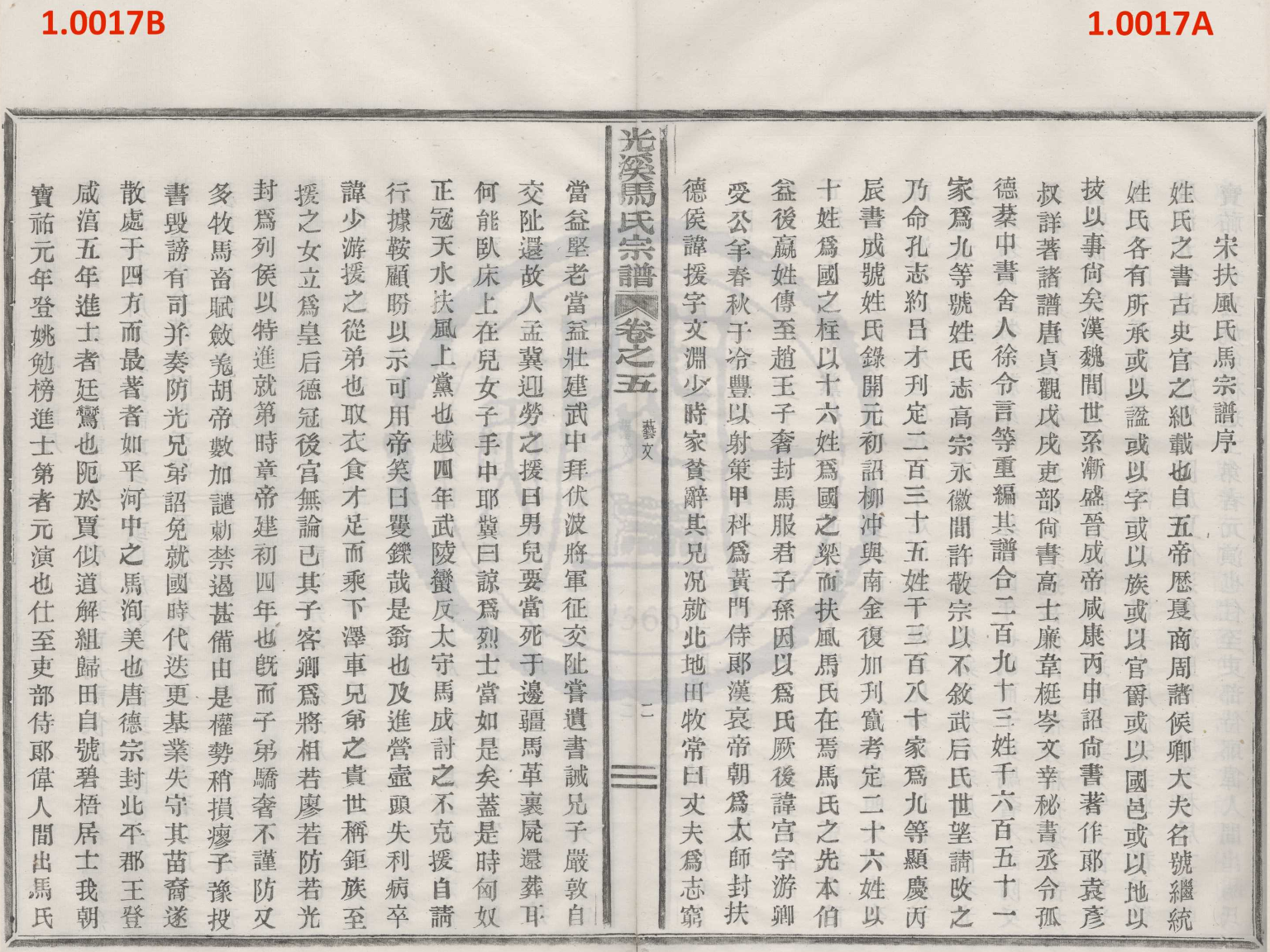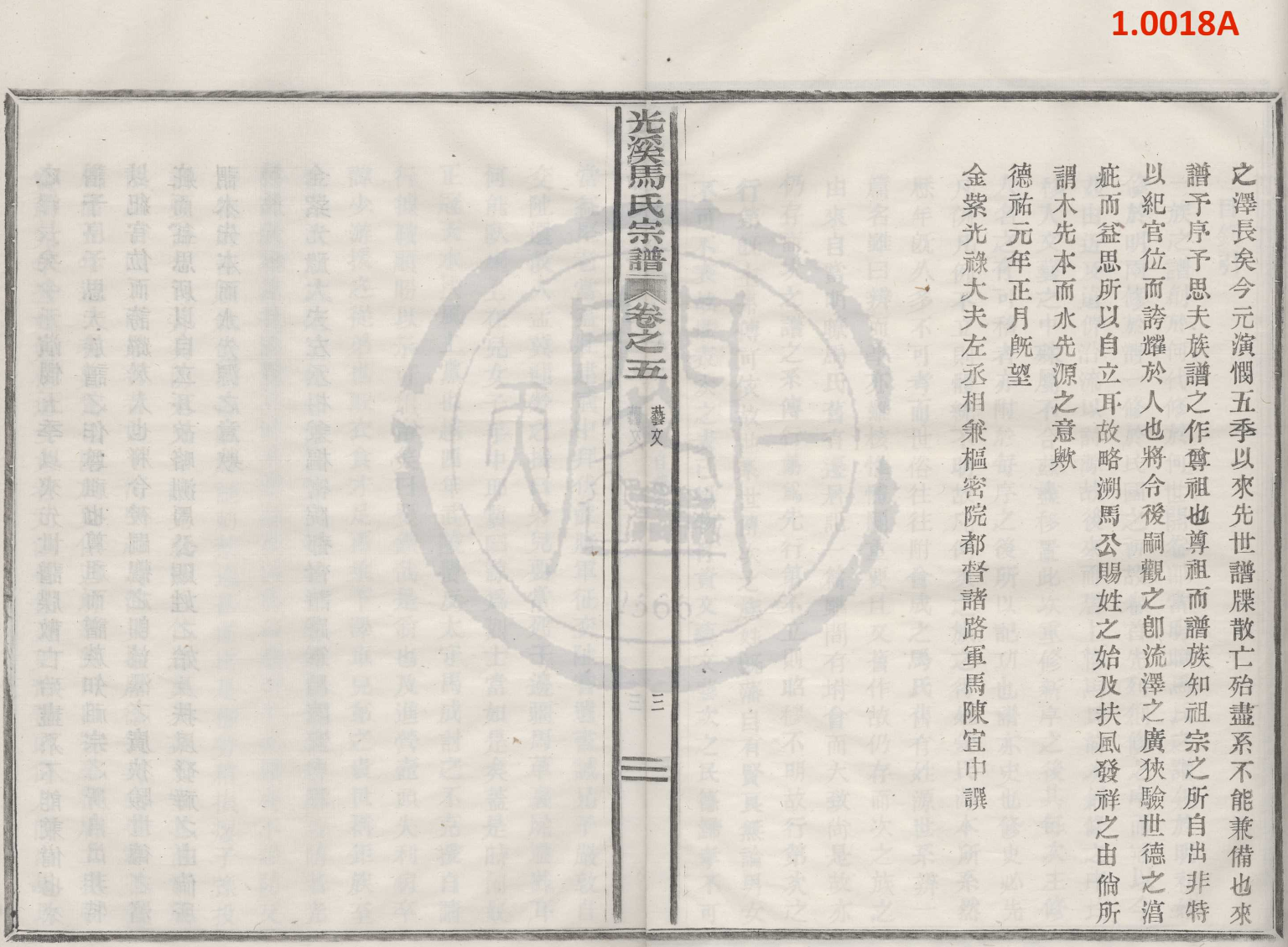Song Fufeng Ma’s Genealogy Preface (1.0017) The book of surnames is the record of ancient historians. Since the Five Emperors, well-known families from the Xia, Shang, and Zhou Dynasties have their records under their own lineage. There are many ways to record surnames, some with posthumous names, some with Zi 字, some with family names, some with appointed officer names, some named after a country or after a location, and some with skills and events to name surnames. During the Han and Wei dynasties, lineages became more and more popular, and Jincheng Emperor Xiankang in the Bingshen year (336 years) summoned heads of the Royal Scribes Yuan Shenbing to create a record. Tang Dynasty Emperor Zhenguan in the year Wuxu (638) ordered Heads of the Court Records Department Gao Shilian and Wei Ting, Zhong Shuling, Cen Wenben, Head Secretariat Linghu Defen, and Imperial Edict Officer Xu Lingyan, and others to re-edit all the 293 surnames, and classify 1,651 families into nine levels of names. Emperor Gaozong during the reign of Yonghui (650-655 years) because Prime Minister Xu Jingzong could not find the narrative of the lineage of Wu Zetian’s, so he requested the Emperor to permit to make an alteration, and ordered Kong Zhiyue and Lu Cai to declare 235 surnames and set 1,380 families as nine levels. Then during the Xian Qing reign of Emperor Gaozong, Yonghui year (656 years), the book was completed and
9 all the family surnames are recorded. At the beginning of Kaiyuan Reign (713 years), Emperor summoned Liuchong and Xue Nanjin to re-edit the text and determined that 10 of the 26 surnames were the pillars of the country and 16 were the beams of the country. Fufeng MA family is one of them. MA’s ancestor is the descendant of Boyi (伯益) with the Ying surname. It was awarded to Prince Zhao Zhaoshe as Mr. Ma Fu, and the descendants henceforth are named Ma Fu as the surname. Ma Gong, other names You Qing, because of his understanding of the classic book “Spring and Autumn Ram” (a commentary on the Spring and Autumn Period) he earned the highest honor of the Imperial Examination (甲科) and was named the Huangmen (yellow door) Officer (Door to the Imperial Court is painted yellow) Han Dynasty Emperor Ai (27 BCE – 1 BCE) named him as the Grand Master (top three officers of the Empire). Or, really like today’s Prime Minister). He was anointed with the title Duke De or Duke of an area (kingdom) called De. Ma Yuan, Zi (another name) Wen Yuan, when he was poor, said to his elder brother Ma Kang he will graze at the faraway northern borderlands. He often said to his older, the poorer is a man, the stronger will be his body. Ma Yuan was Jian Wu General and promoted to be the Fubo General Fubo (Fubo means great ability to surge the waves 降伏波涛). He conquered Jiaozhi (today’s Northern Vietnam) and wrote a letter to his brother’s son telling them that a MAN should die in the frontier, not in bed and the hands of his children. At this time, the Huns were rebelling and creating havoc in the Tianshui Fufeng area, and the Wuling minority had rebellion. High Officer Macheng fought against them without success. So, General Ma Yuan volunteered. He put on his armor, jumped onto the horse, held on to the saddle, looked around, and asked the soldiers to join the army. The emperor said with a smile; this older man was also full of energy. Na Yuan failed to advance past Mt. Hutou (shaped like a teapot), Ma Yuan died of illness. Then Ma Yuan’s daughter became the queen and became the highest person in the harem. Ma Keqing, the son of Ma Yuan, became the General. In year four of Emperor Zhang, the MA grandchildren were extravagant, and many descendants were grazing horses to raise livestock. The royalties imposed a heavy tax on Qianghu (Huns). The emperor repeatedly condemned it, and the MA clan’s power weakened. The most famous, for example, is Ma Xunmei, in the Yellow River area. Tang Dynasty Emperor Dezong named him the King of Peiping (A level of honor below the Emperor or the Prince designate).
In the fifth years of Xian Chun Reign (of Song Emperor Lizong, 1247), Ma Tingluan was an Imperial Examination First Class (like Summa Cum Laude) while working under Prime Minister Jia Yidao decided to give up his military position and returned home to be a farmer and was known as Biwu Lay Monk.
In the first year of Baoyou Reign (Song Dynasty Emperor Lizong 1253), Ma Yuanyan was an Imperial Examination First Class. He was promoted to the position of Vice Department Head of Government Personnel. But, Ma Yuanyan ’s ancestral genealogies were all lost.
The surname of Ma was awarded and began in Fufeng. To know the origin of your ancestor’s surname is not showing off to others, but to make future generations love each other more, loving your ancestors will make you more independent.
The first year of Deyou (1275) is the 16th of the first month.
Written by Chen Zizhong, the prime minister and the governor of Emperor’s Privy Council

